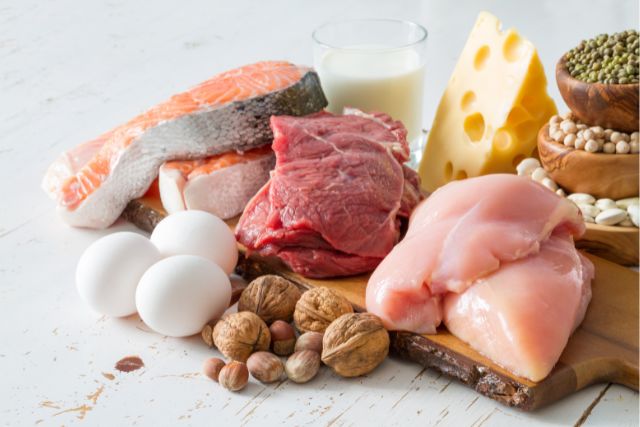Introduction
Losing weight and keeping it off can be challenging. A high-protein diet combined with medical weight loss helps individuals achieve sustainable results. This approach supports fat loss, muscle retention, and metabolism improvement.
Additionally, ad libitum caloric intake in high-protein diets allows people to eat until satisfied while reducing overall calorie intake. This leads to effective weight management and long-term success.
IBI Healthcare offers evidence-based weight loss programs. Moreover, these integrate protein-rich diets and medical weight loss combinations for sustained weight loss and improved health outcomes.
This article explores how a high-protein diet enhances medical weight loss. Additionally, it impacts body composition, metabolism, and appetite regulation.
What is a High-Protein Diet?
This diet includes more dietary protein than standard recommendations. The Food and Nutrition Board suggests 0.8 grams per kilogram of body weight, but many energy-restricted diets provide 1.2–2.0 grams per kilogram.
These diets supply essential amino acids necessary for muscle maintenance and metabolic function.
The Role of Medical Weight Loss in Achieving Health Goals
Medical weight loss programs help individuals lose weight safely and effectively. Specifically, at IBI Healthcare, these programs include:
- Personalized nutrition plans.
- FDA-approved weight loss medications.
- Metabolic assessments.
- Ongoing medical supervision.
When paired with a high-protein diet, these strategies enhance fat loss, metabolic health, and weight maintenance.
How Protein Intake Supports Weight Loss
Higher protein intake helps individuals lose weight by:
- Reducing appetite and controlling food intake.
- Preserving muscle mass while burning fat.
- Boosting metabolism and increasing calorie burn.
- Lowering blood pressure and supporting heart health.
Protein also influences diurnal plasma leptin and ghrelin concentrations, which regulate hunger and satiety.
High-Protein Diets vs. Standard Protein Diets
A standard protein diet provides 10-15% of daily calories from protein, while a high protein diet contains 20-35%.
Comparison Table
| Diet Type | Protein Intake (% of Total Calories) | Benefits |
|---|---|---|
| Standard protein diet | 10-15% | Supports basic metabolism |
| High protein diet | 20-35% | Enhances weight loss, satiety, and muscle retention |
Studies confirm that energy-restricted high-protein diets lead to greater weight loss and, consequently, better body composition.
How Protein Affects Body Composition
A high-protein diet helps reduce fat while preserving lean mass, which is critical for long-term weight maintenance.
Protein also influences bone health by maintaining mineral density and reducing osteoporosis risk.
The Link Between Protein, Blood Pressure, and Metabolic Syndrome
A higher protein intake helps regulate systolic and diastolic blood pressure, thereby reducing the risk of metabolic syndrome.
A diet rich in protein, fiber, and healthy fats also improves blood lipids, insulin sensitivity, and C-reactive protein (CRP) levels.
Can Too Much Protein Be Harmful?
People often worry about too much protein affecting kidney function. However, clinical evidence shows that protein consumption within recommended limits is safe for healthy adults.
Those with chronic kidney disease should monitor protein intake with medical supervision.

Best High-Protein Foods for Weight Loss
Eating high-protein foods maximizes weight loss and muscle retention. Specifically, the best sources include:
- Lean meats (chicken, turkey, fish).
- Eggs and dairy (Greek yogurt, cottage cheese).
- Plant-based proteins (tofu, lentils, quinoa).
- Protein supplements (whey, casein, plant-based powders).
Pairing these with low-carbohydrate, high-protein meal plans further helps optimize fat loss and weight management.
The Science of Protein and Weight Management
A randomized clinical trial found that individuals on high-protein diets experienced:
- Greater weight loss.
- Lower body fat percentages.
- Better fat-free mass retention.
This confirms that increasing protein intake supports long-term weight management and, therefore, helps prevent weight regain.
Clinical Evidence for High-Protein Diets
Several clinical trials confirm the benefits of high-protein diets for weight loss; A 2014 meta-analysis found that higher protein intake led to more significant fat loss and lean mass preservation.
These studies highlight the role of high protein intake in sustained weight loss and, additionally, better health outcomes.
Achieving a Healthy Weight
With a High-Protein Diet, aim for 1.6–2.2 grams of protein per kilogram. Additionally, this helps with weight loss and muscle mass maintenance.
A successful diet should also include:
- Whole, unprocessed foods (lean meats, eggs, dairy, legumes, whole grains).
- Regular exercise (strength training and cardiovascular workouts).
- Healthy fats (avocados, nuts, olive oil).
- High-fiber foods (vegetables, fruits, whole grains).
These habits help promote long-term weight maintenance and overall health.
Medical Weight Loss and High-Protein Diets: A Winning Combination
At IBI Healthcare, our advanced weight loss center integrates high-protein diets with clinically supervised weight loss programs. As a result, patients benefit from:
- Personalized protein intake recommendations.
- Energy-restricted diets tailored to their metabolism.
- Support for preserving lean mass.
This approach ensures sustained weight loss and, furthermore, leads to better health outcomes.
IBI Healthcare’s Medical Weight Loss Medications: Tirzepatide and Semaglutide
IBI Healthcare offers FDA-approved medications for individuals struggling with weight loss. Additionally, these medications enhance high-protein diet results.
Tirzepatide for Weight Loss
- Reduces appetite and food intake.
- Improves glucose control.
- Supports metabolic health for long-term success.
Semaglutide for Weight Loss
- Mimics a natural hormone that regulates hunger and digestion.
- Shown to support significant weight loss in higher-weight adults.
- It enhances the effects by reducing calorie intake, thus supporting weight management.
These medications and a structured weight loss program help patients achieve better results while maintaining lean mass.
Conclusion
The proper diet combined with medical weight loss is undoubtedly one of the most effective strategies for fat loss, muscle retention, and metabolic health.
Individuals can achieve sustained weight management and better overall health by focusing on protein intake, calorie control, and structured weight loss plans.










